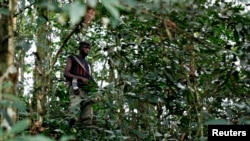UNITED NATIONS —
As the Congolese rebel group M23 began surrendering its weapons Wednesday, neighboring Rwanda called for the Democratic Republic of Congo (DRC) to turn its attention to tackling another rebel group.
Rwanda’s U.N. Ambassador Eugene Gasana told reporters that the Congolese army and the nearly 20,000-strong U.N. peacekeeping mission, known as MONUSCO, must now turn its attention to eliminating a nearly two decades-old scourge: the Hutu rebel group known as the FDLR (Forces démocratiques de libération du Rwanda), which operates in eastern Congo.
“They should have done this some years ago. I hope that this time they will tackle the FDLR. They have to. Otherwise, I won’t let them sleep,” he said.
The United Nations has accused Rwanda of supporting the now defeated M23 rebels in Congo, a charge it denies. The Rwandan government in turn said the DRC supported the FDLR, which is made up of Hutu rebels involved in Rwanda’s 1994 genocide.
Rwanda’s envoy said his country was ready to retaliate, should the FDLR act against it.
The DRC's U.N. ambassador, Ignace Gata, acknowledged that the FDLR is a cause for concern to his government. He said military offensives against the group were put on hold because the army had to deal with the M23 rebellion.
Ambassador Gata said now that the M23 rebellion was over, the government would return to the issue of the FDLR. He said Kinshasa would eradicate all of the armed groups that exist in eastern Congo, including the FDLR, the ADF-Nalu and others.
French Ambassador Gérard Araud told reporters after a Security Council meeting Wednesday that there was general consensus among the 15 members that the FDLR must be dealt with. He said the success against the M23 was only the beginning for this region.
“The M23 combatants must now be disarmed. The Congolese administration needs to get back to the areas which have been just recovered and provide basic services to the population. All other armed groups, beside the M23, which threaten civilians in the Kivus need to be neutralized,” he said.
As for the Kampala peace talks between Kinshasa and the M23 which were suspended on October 21, the French envoy said the DRC government was hesitating to sign an agreement, now that the rebellion was crushed. But he said some sort of understanding between the two sides would be formalized.
Congo’s ambassador confirmed this, saying Kinshasa wanted to complete the Kampala talks and in the coming days would sign a “document” with the M23.
The M23 was formed last April by about 300 former members of the CNDP rebel group who had joined the army following a March 23, 2009 peace agreement.
The rebels-turned-soldiers decided to become rebels again, saying the government had failed to fulfill that agreement and was treating them poorly. Last November, the rebels seized and briefly held the provincial capital of Goma in North Kivu.
Rwanda’s U.N. Ambassador Eugene Gasana told reporters that the Congolese army and the nearly 20,000-strong U.N. peacekeeping mission, known as MONUSCO, must now turn its attention to eliminating a nearly two decades-old scourge: the Hutu rebel group known as the FDLR (Forces démocratiques de libération du Rwanda), which operates in eastern Congo.
“They should have done this some years ago. I hope that this time they will tackle the FDLR. They have to. Otherwise, I won’t let them sleep,” he said.
The United Nations has accused Rwanda of supporting the now defeated M23 rebels in Congo, a charge it denies. The Rwandan government in turn said the DRC supported the FDLR, which is made up of Hutu rebels involved in Rwanda’s 1994 genocide.
Rwanda’s envoy said his country was ready to retaliate, should the FDLR act against it.
The DRC's U.N. ambassador, Ignace Gata, acknowledged that the FDLR is a cause for concern to his government. He said military offensives against the group were put on hold because the army had to deal with the M23 rebellion.
Ambassador Gata said now that the M23 rebellion was over, the government would return to the issue of the FDLR. He said Kinshasa would eradicate all of the armed groups that exist in eastern Congo, including the FDLR, the ADF-Nalu and others.
French Ambassador Gérard Araud told reporters after a Security Council meeting Wednesday that there was general consensus among the 15 members that the FDLR must be dealt with. He said the success against the M23 was only the beginning for this region.
“The M23 combatants must now be disarmed. The Congolese administration needs to get back to the areas which have been just recovered and provide basic services to the population. All other armed groups, beside the M23, which threaten civilians in the Kivus need to be neutralized,” he said.
As for the Kampala peace talks between Kinshasa and the M23 which were suspended on October 21, the French envoy said the DRC government was hesitating to sign an agreement, now that the rebellion was crushed. But he said some sort of understanding between the two sides would be formalized.
Congo’s ambassador confirmed this, saying Kinshasa wanted to complete the Kampala talks and in the coming days would sign a “document” with the M23.
The M23 was formed last April by about 300 former members of the CNDP rebel group who had joined the army following a March 23, 2009 peace agreement.
The rebels-turned-soldiers decided to become rebels again, saying the government had failed to fulfill that agreement and was treating them poorly. Last November, the rebels seized and briefly held the provincial capital of Goma in North Kivu.




